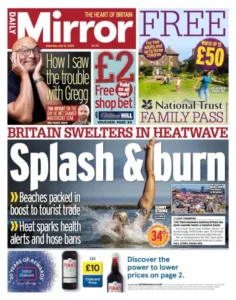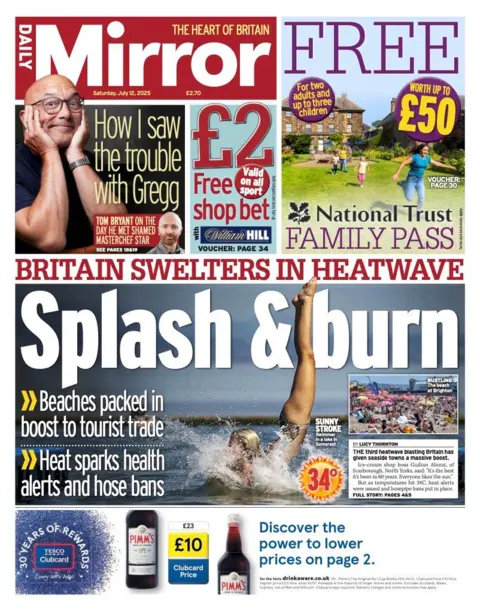In the backdrop of an ongoing heatwave, the headlines across UK papers converge on themes of climate impact, economic challenges, and social dynamics. The prevailing weather patterns have ignited conversations on everything from tourism boosts in seaside towns to strategic government responses concerning air conditioning grants. Simultaneously, the turmoil surrounding potential tax hikes and employees facing financial strain is echoed throughout various articles.
The Daily Mirror captures the essence of the summer heat through a striking front page photo depicting swimmers plunging into a lake in Somerset, emphasizing the public’s endeavor to beat high temperatures during what is noted as the UK’s third heatwave this year. The imagery symbolizes a collective desire for relief in the form of leisure and socialization, as the paper celebrates how these summer conditions have fortified tourism, breathing life back into coastal communities that benefit from beachgoers seeking solace from the sweltering heat.
Conversely, the Financial Times focuses on the broader ramifications of the climate crisis, shedding light on a potential European Union initiative aimed at imposing annual taxes on large corporations operating within its jurisdiction. This initiative is viewed as a strategic effort to bolster the EU budget amidst the financial strains exacerbated by climate change and public demand for sustainable practices. Complementing the discussion of heatwave consequences, a visual narrative captures a woman refreshing herself in a water feature in Dover, reinforcing the rising temperatures’ impact on daily life.
Meanwhile, the i Paper raises a glimmer of hope against the climate’s relentless heat with a report indicating that the UK government is contemplating grants for air conditioning installations in homes. This movement aims to provide residents with much-needed relief from increasing summer heat, positioning the government as responsive to community needs amid climatic turbulence.
Water shortages induced by escalating temperatures garner attention in the Daily Telegraph, which warns that consumers may face heightened costs through smart meter usage during heatwaves. This anticipatory measure from water companies aims to manage resources more efficiently but poses additional financial burdens on families already grappling with the effects of climate change.
The prevailing economic discourse extends into what is dubbed a “tax time bomb,” as highlighted in the Daily Express. The challenges outlined by financial analysts implicate Chancellor Rachel Reeves, whose policies are seen as reckless, risking economic instability for workers across the country. The paper provides a sobering analysis of how fiscal maneuvers could lead the nation into recession, fostering anxiety over job security and economic well-being.
Reporting on political affairs, the Daily Mail presents a critical view of Sir Keir Starmer’s proposed migrant deal with France. The potential for opposition from activists suggests a volatile political landscape, as campaigners prepare to contest actions against individuals seeking asylum via small boats. This political scrutiny hints at challenges ahead for governing bodies attempting to navigate the complexities of immigration policy in a polarized climate.
Adding to the dynamic media landscape, the Guardian portrays the rising tension within Labour circles, specifically focusing on Deputy Prime Minister Angela Rayner, who is facing potential repercussions from her party’s leadership after a controversial vote to suspend her membership from a prominent trade union. This internal strife reflects the fragility of political alliances and the impact of personal relationships on party stability.
The farcical elements of political life resonate through the Daily Star, which employs humor to critique public discourse. By portraying leading political figures, including Donald Trump and Starmer as “clowns,” the paper engages in a satirical take on political narratives, commenting on the increase of skepticism and criticism directed towards politicians.
In conclusion, the newspapers provide a comprehensive look into the intertwining narratives of climate issues, economic struggles, and political challenges facing the UK. From the residents seeking respite from heat to the government grappling with fiscal decisions, each headline encapsulates the multifaceted nature of contemporary societal concerns in a time of both crisis and summer revelry.








